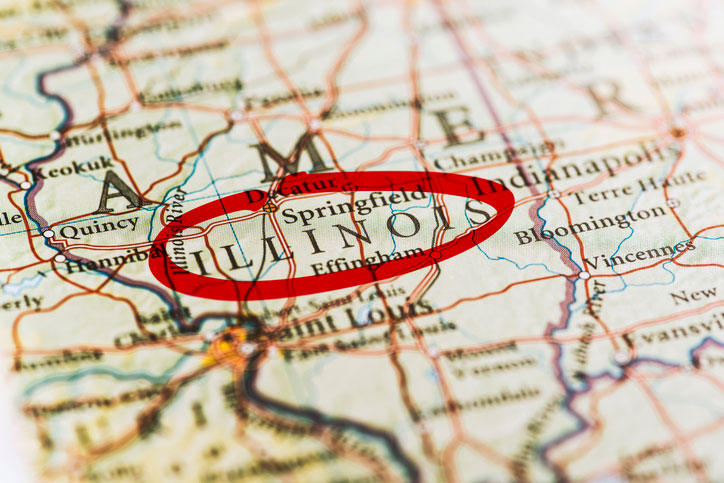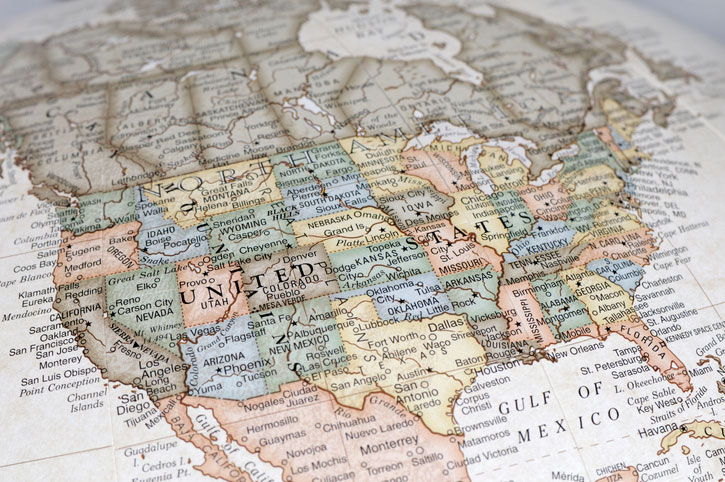Written by Sam Medley

Some states allow social workers licensed in other states to work within their borders without applying for a new license. This is called a license reciprocity agreement. Unfortunately, these agreements are relatively rare. Illinois is one of many states with no formal reciprocity agreements with other states.
However, if you’re a licensed social worker in another state, you may still be eligible for licensure in Illinois through a process called licensure by endorsement.
Through endorsement, a social worker licensed in another state can transfer their social work license to Illinois without going through the entire process again. But if you decide to take this route, you will still need to meet certain requirements. In this guide, we’ll discuss the endorsement process in Illinois and how to transfer your license to other states.
How to Transfer Your Social Work License to Illinois from Another State
To learn how to transfer a social work license to Illinois, it’s important to have a basic understanding of the state’s licensure laws. In short, anyone who wants to become a social worker in Illinois must have a license issued by the Illinois Department of Financial and Professional Regulation (IDFPR).


An Overview of Illinois Social Work Licensing Laws
The IDFPR issues two types of social work licenses — one for Licensed Social Workers (LSW) and one for Licensed Clinical Social Workers (LCSWs).
To be eligible for either license, you must first meet certain criteria:
- Education. LSWs must have a bachelor of social work (BSW) or a Master of Social Work (MSW) from an accredited college or university. LCSWs must have an MSW or a Doctorate-level degree in social work.
- Supervised Fieldwork Experience. LSWs with a Master’s don’t need to complete any additional fieldwork hours. However, those with a BSW must complete a three-year supervised fieldwork experience. Future LCSWs with a Master’s must complete 3,000 hours of fieldwork before applying for a license.
- Exam. LSWs in Illinois don’t need to pass an exam to earn their license. LCSWs, on the other hand, must pass a rigorous 170-question test administered by the Association of Social Work Boards (ASWB). If they don’t pass the exam the first time, they can complete an additional 3,000 hours of supervised fieldwork instead.
While there are other rules and statutes, these three requirements form the core of Illinois’ social work licensure laws.
Requirements for Licensure by Endorsement in Illinois
The law that outlines all of Illinois’ social work policies is called the Clinical Social Work and Social Work Practice Act. In the section on endorsement and out-of-state licensing, it says:
“The Department may issue a license as a clinical social worker or as a social worker, without the required examination, to an applicant licensed under the laws of another jurisdiction if the requirements for licensure in that jurisdiction are, on the date of licensure, substantially equivalent to the requirements of this Act.”
This means that if you’ve already fulfilled the state’s requirements for the level of licensure you’re seeking, you can transfer your social work license to Illinois by submitting an application to the IDFPR. You will also need to include supporting documentation and a $200 fee. The IDFPR usually takes four to six weeks to process applications.

If you’re an LCSW from another state who’s been licensed for five consecutive years, you can transfer your social work license to Illinois without much supporting documentation. You will, however, have to submit proof of licensure in your home jurisdiction.
But that raises an important question — what if you don’t meet the state’s requirements for licensure? Can you still transfer your social work license to Illinois?
Unfortunately, the Clinical Social Work and Social Work Practice Act doesn’t address this issue directly. It’s likely, though, that the IDFPR may require you to fulfill any missing requirements or complete the entire licensing process to transfer your social work license to Illinois. Because Illinois has no social work license reciprocity agreements, the board can offer licensure by endorsement to out-of-state candidates at its own discretion.
The Future of Reciprocity: Reform Is on the Horizon
Despite there being almost 700,000 social workers in the US, people still fall through the cracks. Some areas, especially rural and inner-city communities, are plagued by social service professional shortages. And with each state having its own licensing laws, sending workers where they’re needed most proves challenging.
A national licensing reform initiative hopes to change that.
The Council of State Governments, the Association of Social Work Boards, and the US Department of Defense have come together to draft the Social Work Compact Bill. States that sign the bill into law will become part of an alliance that will allow for streamlined license reciprocity. Ultimately, the bill’s advocates hope to establish multi-state social work licenses — great news for social workers and even better news for the people who count on them.
Seven states must enact a model version of the bill before the alliance is officially formed. As of January 2024, Missouri is the only state to do so. Illinois has yet to come aboard, but 21 states (including neighbors Kentucky, Indiana, and Wisconsin) have started the legislative process. While the National Center for Interstate Compacts works tirelessly to help and encourage states to join, they also call on social workers, professional organizations, and the public at large to lobby their representatives for reform.
Transferring Your Social Work License from Illinois to Another State
Transferring a social work license to Illinois is fairly straightforward. But unfortunately, there’s no single way to transfer an Illinois license to another state. It’s possible, but the requirements you’ll have to fulfill will depend largely on your new home’s policies.

To help you get an idea of what transferring your social work license could be like, here are the endorsement and transfer policies of surrounding states. Keep in mind that these may change and that social work license transfers are typically handled on a case-by-case basis.
Kentucky
Like Illinois, Kentucky has no reciprocity agreements with other states. In general, their LSW and LCSW licensing laws are similar to Illinois’ — LSWs must have a bachelor’s and LCSWs must have a Master’s. However, they require both levels of social worker to pass the appropriate ASWB exam. Those applying for LCSW status must also submit proof that they’ve completed 150 hours of supervised clinical experience or that they’ve practiced clinical social work for at least five years.
Indiana
In Indiana, both LSWs and LCSWs must have a Master’s degree. LSWs must pass the Master’s Level ASWB exam while their LCSW colleagues must pass the Clinical level ASWB exam. Licensed out-of-state applicants must also submit a criminal background check and pass a jurisprudence exam about Indiana laws.
Iowa
Iowa’s social work licensing structure is vastly different to Illinois’. The state’s Department of Inspections, Appeals, and Licensing issues three types of licenses:
- LBSW.
- LBSW-Independent Practice (LBSW-IP).
- LMSW.
- LCSW.
- Licensed Advanced Macro Social Worker (LAMSW) — a unique license for Advanced Generalists and administrators.
Applicants must pass the required ASWB exam and complete a certain number of supervision hours. Supervision requirements for LCSWs in Missouri (2,250 hours and 18 months) are similar to those of LCSWs in Illinois. Applicants must complete 2 hours of suicide prevention training. The state also offers temporary social worker permits.
Wisconsin
The Wisconsin Chapter of the NASW reports that the state has four levels of licensure:
- Certified Social Worker (CSW).
- Advanced Practice Social Worker (APSW).
- Certified Independent Social Worker (CISW).
- LCSW.
Applicants must pass the appropriate ASWB exam for their level of licensure. The Department of Safety and Professional Services handles endorsements and reciprocity on a case-by-case basis. However, they say Illinois and Wisconsin LCSW licensing requirements aren’t similar enough for reciprocity.
Author

Sam is a freelance writer with a passion for learning about any and everything he can. When not reading or writing, he can be found helping his wife tend to the bees, ducks, chickens, and plants that populate their little Kentucky homestead.
View all posts






